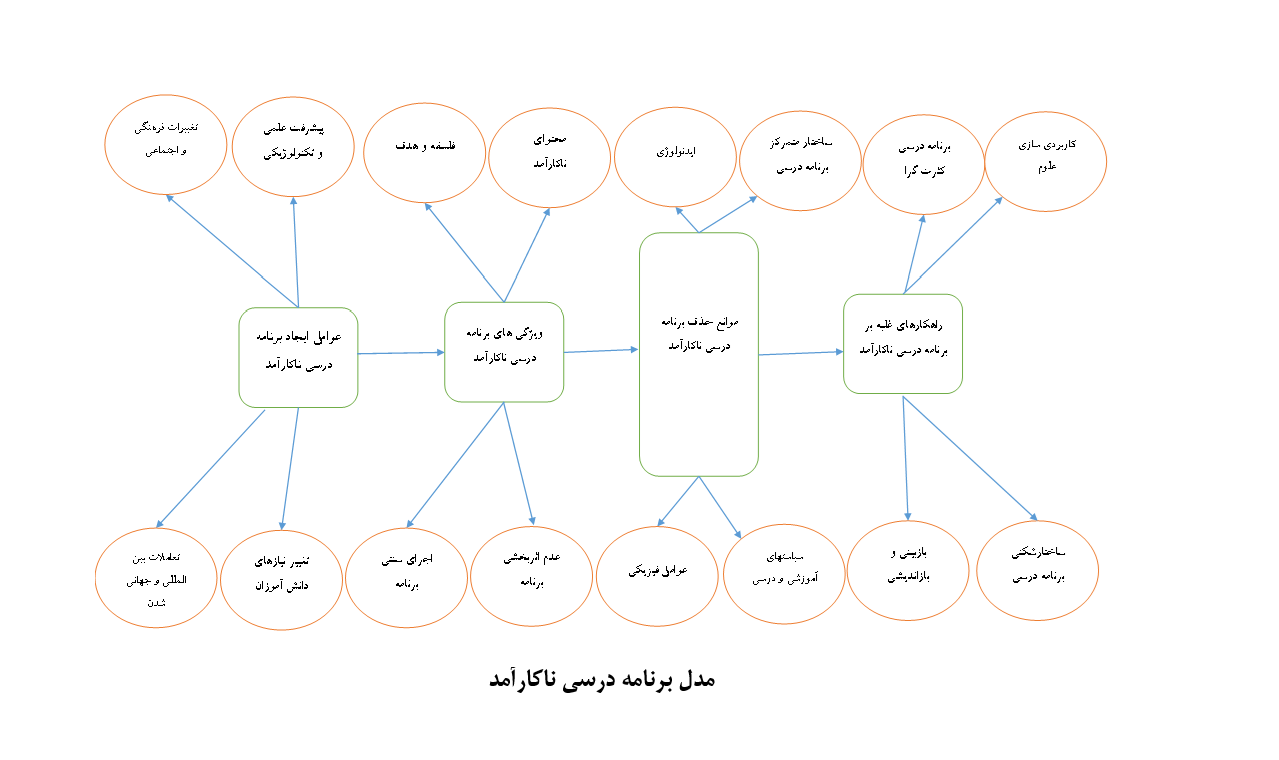طراحی و اعتبار سنجی مدل برنامه درسی زائد از دید معلمان دوره ابتدایی
کلمات کلیدی:
طراحی , مدل, برنامه , درسی , زائد, معلمان , دوره , ابتداییچکیده
هدف این مطالعه طراحی و اعتبار سنجی مدل برنامه درسی زائد از دید معلمان دوره ابتدایی بود. پژوهش حاضر جزء طرحهای ترکیبی اکتشافی متوالی از نوع ابزار سازی است. بخش کیفی با روش پدیدارشناسی و به کمک تحلیل محتوای کلایزی انجام شد. جهت گردآوری دادهها از روش نمونه گیری هدفمند از نوع موارد مطلوب استفاده گردید. بر اساس قاعده اشباع نظری اطلاعات جمع آوری شده از نفر بیست و هفتم به اشباع نظری رسید. ابزار گردآوری دادههای کیفی، مصاحبههای عمیق نیمه ساختمند بود. اعتبار یافتهها به شیوه گوبا و لینکلن و از روش توافق درون موضوعی برای محاسبه پایایی مصاحبهها استفاده شد. بخش کمی نیز، از نوع توصیفی پیمایشی بود. جامعه آماری در این بخش شامل معلمان و اساتید برنامه ریزی درسی بود که مقالات و مطالعاتی در زمینه موضوع مورد تحقیق داشتند. با استفاده از روش نمونه گیری هدفمند، تعداد 220 نفر از معلمان مقطع ابتدایی و 25 نفر از اساتید برنامه ریزی درسی استان اصفهان انتخاب گردیدند. جمع آوری اطلاعات از طریق پرسشنامه محقق ساخته بود. جهت بررسی روایی پرسشنامه طراحی شده از روش روایی محتوایی و روایی سازه و جهت تعیین پایایی پرسشنامه از آلفای کرونباخ استفاده شد که میزان پایایی کل 89/0 را نشان داد. تحلیل عاملی تاییدی و مدل معادلات ساختاری جهت تجزیه و تحلیل اطلاعات بکار گرفته شد. نتایج بخش کیفی چهار مضمون عوامل ایجاد برنامه درسی ناکارآمد، ویژگیهای برنامه درسی ناکارآمد، موانع حذف برنامه درسی ناکارآمد و راهکارهای غلبه بر برنامه درسی ناکارآمد را مورد شناسایی قرار داد. همچنین نتایج بخش کمی، مدل طراحی شده از دیدگاه صاحبنظران را مورد تایید قرار داد.
دانلودها
مراجع
Hosseini Largani SM, Fathi Vajargah K. Conceptualizing Superfluous Learning in Iran's Higher Education System. Curriculum Studies in Higher Education. 2018.
Hosseini Largani SM, Fathi Vajargah K, Arefi M, Zarafshani K. Conceptualizing Superfluous Learning and Strategies for Reducing It in Iran's Higher Education System from the Perspective of Higher Education Experts. Journal of Educational Measurement and Evaluation Studies. 2015;5(9):33-9.
Fathi Vajargah K. Superfluous/Disposable Curriculum 2011.
Taziki Z, Mahmoud Firouzi Moghadam AK, Hossein Momeni M. Analysis of the Seventh Grade Persian Textbook Compared to the Art Book in Terms of Communication Skills and Capabilities. Journal of Islamic Art Studies. 2022;19(47):70-90.
Mattox JR. Scrap Learning and Manager Engagement: Www.clomedia.com; 2011.
Kuraev A. Soviet higher education: An alternative construct to the western university paradigm. Higher Education. 2016:181-93. doi: 10.1007/s10734-015-9895-5.
Moran E, Seaneen S, Elaine W, Laura T. Exploring restorative practices: Teachers' experiences with early adolescents. International Journal of Educational Research Open. 2024;6:100323. doi: 10.1016/j.ijedro.2024.100323.
Parhizkar L. Explaining the Various Dimensions of the Curriculum (Hidden, Superfluous, and Empty) of Environmental Education in Secondary Schools to Provide Solutions for Enhancing Students' Environmental Literacy: Shahid Beheshti University, Faculty of Educational Sciences and Psychology; 2019.
Murai Y, Juan AYS. Making as an opportunity for classroom assessment: Canadian maker educators' views on assessment. International Journal of Child-Computer Interaction. 2024;39:100631. doi: 10.1016/j.ijcci.2023.100631.
Hassanpour Dehnavi GR, Momeni Mohammadi H, Zirak M, Ajjam AA. Designing and Validating a Superfluous Curriculum Model with a Mixed Approach (Case Study: Curriculum of Technical and Vocational Schools in Secondary Education). Innovations in Educational Management. 2021;17(4):60-75.
Halimi A, Sayyedeh Esmat R, Vahid F. Investigating the Impact of Superfluous Curriculum on Advancement Goals (Educational and Skill Domains) and Empowering Students in Medical Sciences in Mazandaran Province. Quarterly Journal of Jundi Shapur Education Development. 2021;12(1):268-80.
Salehi M, Dehghani M, Khatat M. Reflections on the Superfluous Curriculum in the Primary Education Field. Theory and Practice in Curriculum. 2023;11(21):38-9.
Hasanefendic S, Heitor M, Horta H. Training students for new jobs: The role of technical and vocational higher education and implications for science policy in Portugal. Technological Forecasting and Social Change. 2016:328-40. doi: 10.1016/j.techfore.2015.12.005.
Bacchini D, Esposito C, Affuso G, Amodeo AL. The impact of personal values, gender stereotypes, and school climate on homophobic bullying: A multilevel analysis. Sexuality Research and Social Policy. 2021;18(3):598-611. doi: 10.1007/s13178-020-00484-4.
Bourke S, Burgman I. Coping with bullying in Australian schools: How children with disabilities experience support from friends, parents, and teachers. Disability and Society. 2020;25(3):359-71. doi: 10.1080/09687591003701264.
Momeni Mahmooei H, Hassanpour Dehnavi GR, Zirak M, Ajjam AA. Exploring the Dimensions of the Superfluous Curriculum in the Second Cycle of Technical and Vocational Education. Bi-Monthly Scientific-Research Journal of Strategies in Medical Sciences. 2021;14(2):72-81.
Bray M, Alexandre V. Multiple systems, multiple shadows: Diversity of supplementary tutoring received by private-school students in Dubai. International Journal of Educational Development. 2023;92:102624. doi: 10.1016/j.ijedudev.2022.102624.
Vigren H, Jenni A, Leena Maria H, Emmanuel OA, Nancy LC. Teaching immigrant students: Finnish teachers' understandings and attitudes. Teaching and Teacher Education. 2022;114:103689. doi: 10.1016/j.tate.2022.103689.
Zulhernanda W. Teachers' perceptions on application of 2013 curriculum for elementary school in Medan. Advances in Language and Literary Studies. 2018;9(1):62-6. doi: 10.7575/aiac.alls.v.9n.1p.62.
Altinyelken HK. Curriculum change in Uganda: Teacher perspectives on the new thematic curriculum. International journal of educational development. 2010;30(2):151-61. doi: 10.1016/j.ijedudev.2009.03.004.
Sajoudi A. Comparative Analysis of the Role and Contribution of Each Element of the Curriculum in Shaping and Reducing Superfluous Learning from the Perspective of Students at Dezful Parsay Universities: Kashan University; 2017.
Barshan A, Safaie Moahed S, Valiollah F, Kiamanesh A, Moghadam Zadeh A. Factors Influencing the Formation of Superfluous Learning in In-Service Training: A Qualitative Study. Qualitative Research in Health Sciences. 2018;7(4):418-27.
Yasemi S, Hosseini Khah A, Kian M. A Reflection on the Characteristics of Creativity-Based Curriculum in Primary Education. Research in Primary Education. 2022;4(7):1-19.

دانلود
چاپ شده
ارسال
بازنگری
پذیرش
شماره
نوع مقاله
مجوز
حق نشر 2025 Sajjad Izadi (Author); Mehdi Keshavarzi (Corresponding author); Farzaneh Vasefian (Author)

این پروژه تحت مجوز بین المللی Creative Commons Attribution-NonCommercial 4.0 می باشد.










